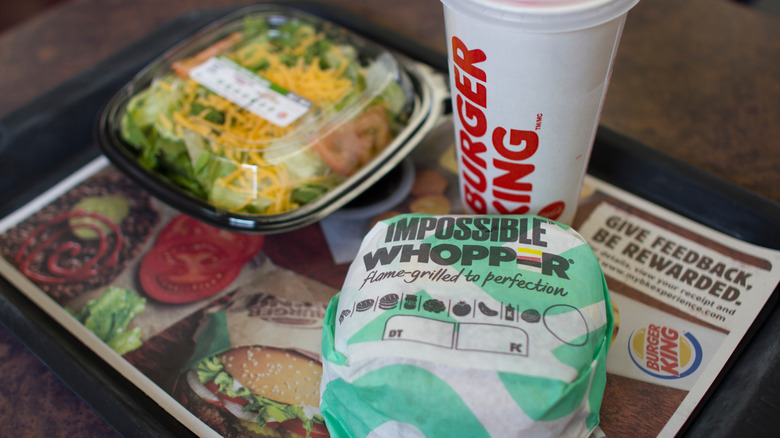Why Impossible Foods Just Laid Off 6% Of Its Employees
Food-industry vernacular expanded in a big way after plant-based foods rocketed into grocery stores, home kitchens, and production facilities. Commonly referred to as the plant-based alternatives (PBA) industry, specific brand names came to represent sub-segments such as "plant-based meats" – including the popular Impossible Burgers, which even appear on Burger King menus as an alternative to the classic Whopper. Now, the makers of those burgers, Impossible Foods, have announced a 6% reduction in its workforce, according to Food Dive.
With Bloomberg reporting extraordinary growth expectations for the PBA market only a year ago, the workforce reductions from major players such as Impossible may seem incongruous. The "Plant-Based Foods Poised for Explosive Growth" report by Bloomberg Intelligence predicted potential growth between 2020 and 2030, rising from $29.4 billion to $162 billion, thereby constituting 7.7% of the global protein market.
With such forward-movement predictions and extraordinary growth potential, why are plant-based food businesses laying off workers, cutting profit projections, or even closing down altogether? The Denver Business Journal reported in early October 2022 that the JBS USA startup Planterra Foods would be shuttering its new Denver production facility less than 12 months after opening, citing a full shutdown of the U.S. meat-alternative enterprise. Its competitors, however, are thus far cutting staff or joining forces rather than pulling the plug.
The reasons for recent worker layoffs vary, but Impossible Foods claims a deliberate reformulation for future growth rather than downsizing its workforce as a reactionary measure.
Growth, change, and innovation
The 6% employee reduction at Impossible Foods, headquartered in the San Francisco Bay area, comes on top of an earlier round of layoffs in 2022 and a halt in plans to go public, notes the Silicon Valley Business Journal. But calculations behind the change are more complex than they appear.
Reasons for current employee pullbacks in the burgeoning plant-based alternatives (PBA) industry overall range from slower-than-expected growth to food inflation, consumer perception, supply chain interruptions, and, in the case of plant-based meats, a generally higher price point than animal-based meats, explains the Good Food Institute. But some of these setbacks are potentially temporary, leading Impossible Foods to recalculate future plans and goals, thereby cutting or reallocating staff to accommodate correlating growth expectations, explains Food Dive.
Impossible's new CEO, Peter McGuinness, revealed to Bloomberg Technology that the company is actually experiencing growth in the range of 65 to 70%, with good cash positions and solid balance sheets. The reported layoffs have more to do with growth, company evolution, and strengthening of operations and supply-and-demand functionality, according to an Impossible company memo reported by Food Dive.
The goal is to accommodate planned "hyper-growth" through agility, speed, and adaptability, which makes some employee jobs redundant and misaligned with future core business priorities. Workers losing their jobs will receive severance, job placement assistance, and extended benefits. Meanwhile, Impossible Foods founder Pat Brown is reportedly pioneering an innovative offshoot of the company known as Impossible Labs, according to Business Insider.

